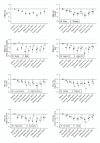Mental health in Germany before, during and after the COVID-19 pandemic
- PMID: 39752443
- PMCID: PMC11698453
- DOI: 10.1371/journal.pone.0313689
Mental health in Germany before, during and after the COVID-19 pandemic
Abstract
Based on nationally representative panel data (N person-years = 40,020; N persons = 18,704; Panel Labour Market and Social Security; PASS) from 2018 to 2022, we investigate how mental health changed during and after the COVID-19 pandemic. We employ time-distributed fixed effects regressions to show that mental health (Mental Health Component Summary Score of the SF-12) decreased from the first COVID-19 wave in 2020 onward, leading to the most pronounced mental health decreases during the Delta wave, which began in August 2021. In the summer of 2022, mental health had not returned to baseline levels. An analysis of the subdomains of the mental health measure indicates that long-term negative mental health changes are mainly driven by declines in psychological well-being and calmness. Furthermore, our results indicate no clear patterns of heterogeneity between age groups, sex, income, education, migrant status, childcare responsibilities or pre-COVID-19 health status. Thus, the COVID-19 pandemic appears to have had a uniform effect on mental health in the German adult population and did not lead to a widening of health inequalities in the long run.
Copyright: © 2025 Patzina et al. This is an open access article distributed under the terms of the Creative Commons Attribution License, which permits unrestricted use, distribution, and reproduction in any medium, provided the original author and source are credited.
Conflict of interest statement
The authors have declared that no competing interests exist.
Figures




Similar articles
-
Household-income trajectories and mental health inequalities in Germany before, during, and after the COVID-19 pandemic: a quasi-experimental panel study.Int J Equity Health. 2025 May 19;24(1):143. doi: 10.1186/s12939-025-02507-1. Int J Equity Health. 2025. PMID: 40390057 Free PMC article.
-
Mental health of individuals with pre-existing mental illnesses at the beginning of the COVID-19 pandemic: results of the German National Cohort (NAKO).Front Public Health. 2024 Sep 23;12:1451631. doi: 10.3389/fpubh.2024.1451631. eCollection 2024. Front Public Health. 2024. PMID: 39377001 Free PMC article.
-
Intersectional inequalities in mental health by education, income, gender, and age before and during the COVID-19 pandemic in the Netherlands: a longitudinal study.Int J Equity Health. 2024 Nov 25;23(1):250. doi: 10.1186/s12939-024-02338-6. Int J Equity Health. 2024. PMID: 39587583 Free PMC article.
-
Mental burden and its risk and protective factors during the early phase of the SARS-CoV-2 pandemic: systematic review and meta-analyses.Global Health. 2021 Mar 29;17(1):34. doi: 10.1186/s12992-021-00670-y. Global Health. 2021. PMID: 33781283 Free PMC article.
-
Mental health problems in the general population during and after the first lockdown phase due to the SARS-Cov-2 pandemic: rapid review of multi-wave studies.Epidemiol Psychiatr Sci. 2021 Mar 9;30:e27. doi: 10.1017/S2045796021000160. Epidemiol Psychiatr Sci. 2021. PMID: 33685551 Free PMC article. Review.
Cited by
-
Trajectories of Mental Distress and Resilience During the COVID-19 Pandemic Among Healthcare Workers.Healthcare (Basel). 2025 Mar 6;13(5):574. doi: 10.3390/healthcare13050574. Healthcare (Basel). 2025. PMID: 40077136 Free PMC article.
-
Longitudinal patterns of mental well-being over four years in a german general population sample: a growth mixture modeling approach.BMC Public Health. 2025 Jun 26;25(1):2175. doi: 10.1186/s12889-025-23539-w. BMC Public Health. 2025. PMID: 40571917 Free PMC article.
-
Impact of social isolation on mental health changes by socio-economic status: A moderated mediation analysis among non-migrant, migrant, and refugee subpopulations in Germany, 2016-2020.SSM Popul Health. 2025 Jun 6;31:101822. doi: 10.1016/j.ssmph.2025.101822. eCollection 2025 Sep. SSM Popul Health. 2025. PMID: 40547598 Free PMC article.
References
-
- Cénat JM, Blais-Rochette C, Kokou-Kpolou CK, Noorishad PG, Mukunzi JN, McIntee SE, et al.. Prevalence of symptoms of depression, anxiety, insomnia, posttraumatic stress disorder, and psychological distress among populations affected by the COVID-19 pandemic: a systematic review and meta-analysis. Psychiatry Res. 2021; 295:113599. doi: 10.1016/j.psychres.2020.113599 - DOI - PMC - PubMed
-
- Cénat JM, Farahi SMMM, Dalexis RD, Darius WP, Bekarkhanechi FM, Poisson H, et al.. The global evolution of mental health problems during the COVID-19 pandemic: a systematic review and meta-analysis of longitudinal studies. J Affect Disord. 2022; 315:70–95. doi: 10.1016/j.jad.2022.07.011 - DOI - PMC - PubMed
-
- Etikan I, Musa SA, Alkassim RS. Comparison of convenience sampling and purposive sampling. Am J Theor Appl Stat. 2016; 5(1):1–4.
MeSH terms
LinkOut - more resources
Full Text Sources
Medical

